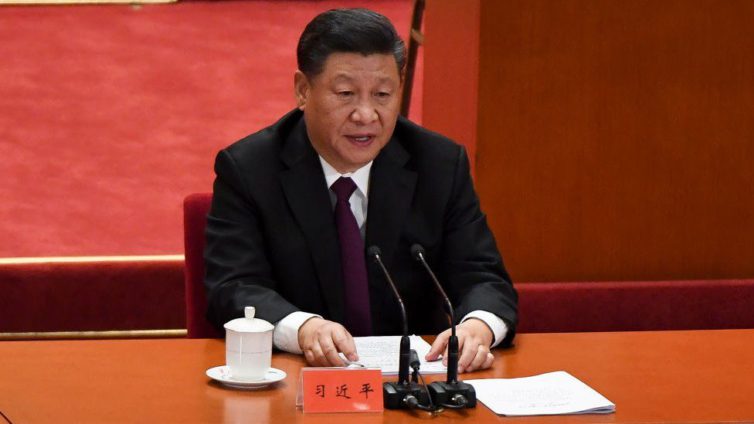
Audio By Carbonatix
China's President Xi Jinping has said in a speech that "reunification" with Taiwan "must be fulfilled".
Mr Xi added that unification should be achieved peacefully, but warned that the Chinese people had a "glorious tradition" of opposing separatism.
In response, Taiwan's presidential office said the future of the island lay in the hands of its people.
Taiwan considers itself a sovereign state. China, however, views Taiwan as a breakaway province.
Beijing has not ruled out the possible use of force to achieve unification.
Mr Xi's intervention follows a spate of about 150 Chinese military flights into Taiwan's air defence zone over the past week.
But the speech, which came on the 110th anniversary of the revolution that overthrew China's last imperial dynasty in 1911, was more conciliatory than his last major intervention on Taiwan in July, where he pledged to "smash" any attempts at formal Taiwanese independence.
"The historical task of the complete reunification of the motherland must be fulfilled, and will definitely be fulfilled," Mr Xi said.
He said he wanted to see peaceful unification occur under a "one country-two systems" policy, similar to that employed in Hong Kong.
"Taiwan independence separatism is the biggest obstacle to achieving the reunification of the motherland, and the most serious hidden danger to national rejuvenation," he added.
But Taiwan's presidential office said that public opinion was very clear in rejecting one country-two systems. It urged Beijing to abandon its "provocative steps of intrusion, harassment and destruction".
Despite the heightened tensions over the past several weeks, relations between China and Taiwan have not deteriorated to levels last seen in 1996 when China tried to disrupt presidential elections with missile tests and the US dispatched aircraft carriers to the region to dissuade them.
And while a number of Western countries have expressed concern at China's displays of military might, US President Joe Biden said Mr Xi had agreed to abide by the "Taiwan agreement".
Mr Biden appeared to be referring to Washington's longstanding "one China" policy under which it recognises China rather than Taiwan.
However, this agreement also allows Washington to maintain a "robust unofficial" relationship with Taiwan. The US sells arms to Taiwan as part of Washington's Taiwan Relations Act, which states that the US must help Taiwan defend itself.
The "One China" policy, which Mr Biden and Mr Xi are believed to have referred to, is a key cornerstone of Sino-US relations but is distinct from the One China principle, whereby China insists Taiwan is an inalienable part of one China to be reunified one day.
Latest Stories
-
Ayawaso East voters to elect a new MP today
2 minutes -
Minority introduces bill to tighten fiscal discipline in Ghana
12 minutes -
NCCE calls for peaceful conduct of Ayawaso East by-election on Tuesday
19 minutes -
Ghana’s nuclear projects in limbo; face delays over funding gap for critical studies
25 minutes -
Mahama urges African countries to deepen commitment to African Court on Human and Peoples’ Rights
31 minutes -
Build a war chest – Theo Acheampong makes case for leveraging gold to boost reserves
1 hour -
Former CJ Sophia Akuffo narrates how Ghana almost broke the Accra monopoly on legal training
2 hours -
Quality, not quantity – Former CJ Sophia Akuffo defends strict legal training standards
2 hours -
Daily Mail royal editor denies seeking Prince Harry flight details
2 hours -
Woman jailed two years for stealing church items at Teshie Barracks
3 hours -
Farmer gets 18 years prison term for defiling 8-year-old girl
3 hours -
Atimpoku fuel contamination: Defence witness admits petrol dispensed to customer mixed with water
3 hours -
Rembrandt painting worth millions rediscovered after 65 years
3 hours -
One of UK’s richest men wants German citizenship over ‘hostility’ to Jews
5 hours -
Bars close and hundreds lose jobs as US firm buys Brewdog in £33m deal
5 hours

